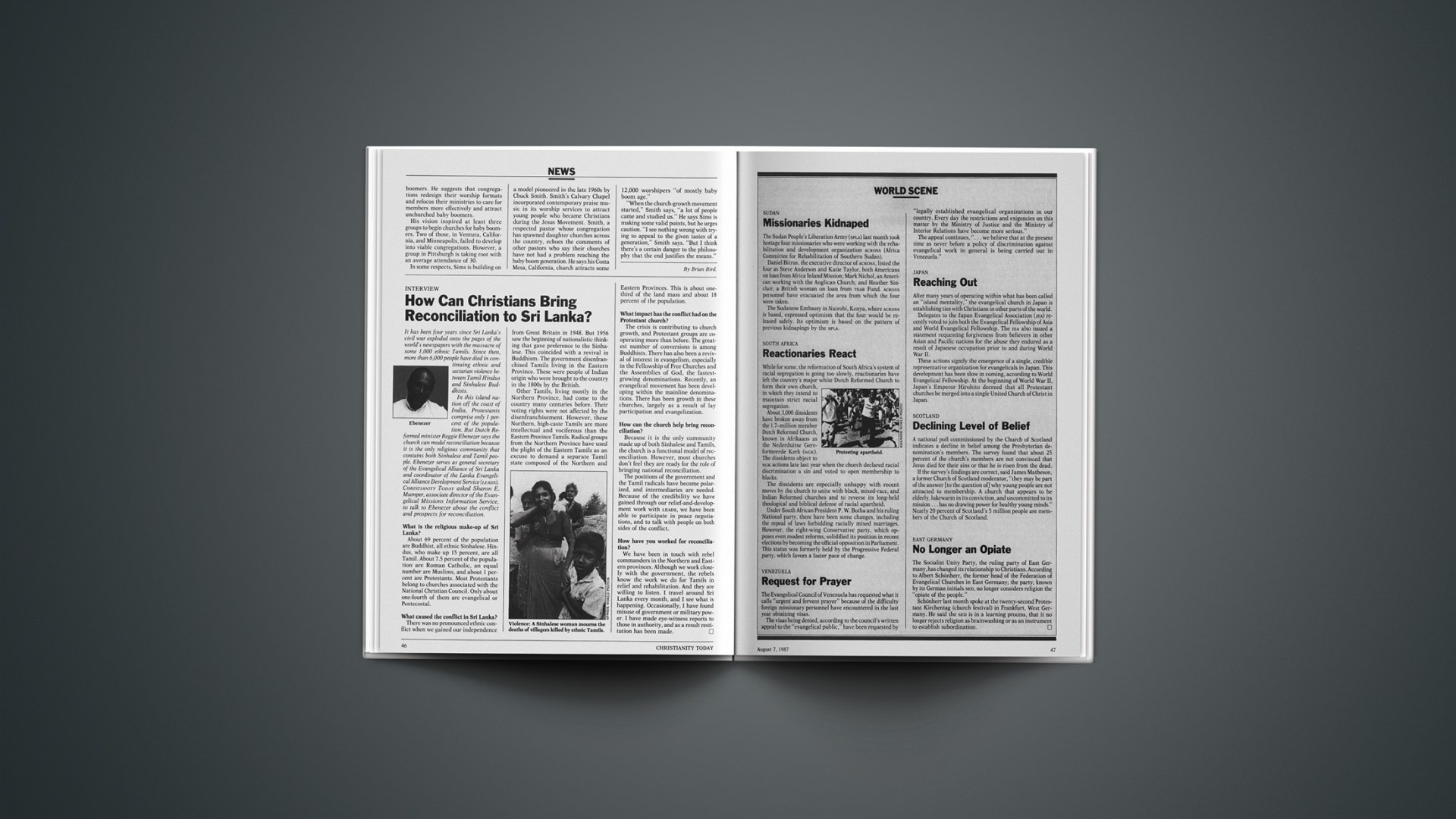SUDAN
Missionaries Kidnaped
The Sudan People’s Liberation Army (SPLA) last month took hostage four missionaries who were working with the rehabilitation and development organization ACROSS (Africa Committee for Rehabilitation of Southern Sudan).
Daniel Bitrus, the executive director of ACROSS, listed the four as Steve Anderson and Katie Taylor, both Americans on loan from Africa Inland Mission; Mark Nichol, an American working with the Anglican Church; and Heather Sinclair, a British woman on loan from TEAR Fund. ACROSS personnel have evacuated the area from which the four were taken.
The Sudanese Embassy in Nairobi, Kenya, where ACROSS is based, expressed optimism that the four would be released safely. Its optimism is based on the pattern of previous kidnapings by the SPLA.
SOUTH AFRICA
Reactionaries React
While for some, the reformation of South Africa’s system of racial segregation is going too slowly, reactionaries have left the country’s major white Dutch Reformed Church to form their own church, in which they intend to maintain strict racial segregation.
About 3,000 dissidents have broken away from the 1.7-million member Dutch Reformed Church, known in Afrikaans as the Nederduitse Gereformeerde Kerk (NGK).
The dissidents object to NGK actions late last year when the church declared racial discrimination a sin and voted to open membership to blacks.
The dissidents are especially unhappy with recent moves by the church to unite with black, mixed-race, and Indian Reformed churches and to reverse its long-held theological and biblical defense of racial apartheid.
Under South African President P. W. Botha and his ruling National party, there have been some changes, including the repeal of laws forbidding racially mixed marriages. However, the right-wing Conservative party, which opposes even modest reforms, solidified its position in recent elections by becoming the official opposition in Parliament. This status was formerly held by the Progressive Federal party, which favors a faster pace of change.
VENEZUELA
Request For Prayer
The Evangelical Council of Venezuela has requested what it calls “urgent and fervent prayer” because of the difficulty foreign missionary personnel have encountered in the last year obtaining visas.
The visas being denied, according to the council’s written appeal to the “evangelical public,” have been requested by “legally established evangelical organizations in our country. Every day the restrictions and exigencies on this matter by the Ministry of Justice and the Ministry of Interior Relations have become more serious.”
The appeal continues, “… we believe that at the present time as never before a policy of discrimination against evangelical work in general is being carried out in Venezuela.”
JAPAN
Reaching Out
After many years of operating within what has been called an “island mentality,” the evangelical church in Japan is establishing ties with Christians in other parts of the world.
Delegates to the Japan Evangelical Association (JEA) recently voted to join both the Evangelical Fellowship of Asia and World Evangelical Fellowship. The JEA also issued a statement requesting forgiveness from believers in other Asian and Pacific nations for the abuse they endured as a result of Japanese occupation prior to and during World War II.
These actions signify the emergence of a single, credible representative organization for evangelicals in Japan. This development has been slow in coming, according to World Evangelical Fellowship. At the beginning of World War II, Japan’s Emperor Hirohito decreed that all Protestant churches be merged into a single United Church of Christ in Japan.
SCOTLAND
Declining Level Of Belief
A national poll commissioned by the Church of Scotland indicates a decline in belief among the Presbyterian denomination’s members. The survey found that about 25 percent of the church’s members are not convinced that Jesus died for their sins or that he is risen from the dead.
If the survey’s findings are correct, said James Matheson, a former Church of Scotland moderator, “they may be part of the answer [to the question of] why young people are not attracted to membership. A church that appears to be elderly, lukewarm in its conviction, and uncommitted to its mission … has no drawing power for healthy young minds.” Nearly 20 percent of Scotland’s 5 million people are members of the Church of Scotland.
EAST GERMANY
No Longer An Opiate
The Socialist Unity Party, the ruling party of East Germany, has changed its relationship to Christians. According to Albert Schönherr, the former head of the Federation of Evangelical Churches in East Germany, the party, known by its German initials SED, no longer considers religion the “opiate of the people.”
Schönherr last month spoke at the twenty-second Protestant Kirchentag (church festival) in Frankfurt, West Germany. He said the SED is in a learning process, that it no longer rejects religion as brainwashing or as an instrument to establish subordination.









